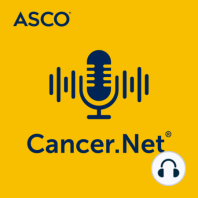17 min listen

2022 Research Round Up: Multiple Myeloma, Breast Cancer, and Cancer in Adults 60 and Over
2022 Research Round Up: Multiple Myeloma, Breast Cancer, and Cancer in Adults 60 and Over
ratings:
Length:
32 minutes
Released:
Jul 28, 2022
Format:
Podcast episode
Description
ASCO: You’re listening to a podcast from Cancer.Net. This cancer information website is produced by the American Society of Clinical Oncology, known as ASCO, the voice of the world's oncology professionals. The purpose of this podcast is to educate and to inform. This is not a substitute for professional medical care and is not intended for use in the diagnosis or treatment of individual conditions. Guests on this podcast express their own opinions, experience, and conclusions. Guests’ statements on this podcast do not express the opinions of ASCO. The mention of any product, service, organization, activity, or therapy should not be construed as an ASCO endorsement. Cancer research discussed in this podcast is ongoing, so data described here may change as research progresses. In the Research Round Up series, ASCO experts and members of the Cancer.Net Editorial Board discuss the most exciting and practice-changing research in their field and explain what it means for people with cancer. In today’s episode, our guests will discuss new research in multiple myeloma, breast cancer, and cancer in adults 60 and over that was presented at the 2022 ASCO Annual Meeting, held June 3-7. First, Dr. Sagar Lonial discusses a study on treatment for newly-diagnosed multiple myeloma in people under 65. Dr. Lonial is a professor of Hematology and Medical Oncology at Winship Cancer Institute at Emory University, where he also serves as Department Chair. He is also the Cancer.Net Associate Editor for Myeloma. View Dr. Lonial’s disclosures at Cancer.Net. Dr. Lonial: Hello, I'm Dr. Sagar Lonial from the Winship Cancer Institute of Emory University in Atlanta, Georgia. And today I'm going to discuss one of the Plenary abstracts at ASCO 2022, which was the DETERMINATION study, again, presented at the ASCO Annual Meeting. For the sake of disclosure, I just want to make sure I list that I was an investigator on this study. I also have consulting relationships with Takeda, Celgene, BMS, Janssen, and other companies that have agents in the context of multiple myeloma. So the reason I want to talk about this study today is I think it's a really important study that was designed over a decade ago to really ask the question, with a really powerful induction regimen that uses what we now call the RVd regimen, lenalidomide with bortezomib and dexamethasone, do you really still need to have high-dose therapy and autologous transplant as part of the treatment approach? And so the trial was a very simple randomized trial that everybody received RVd induction. And then there was a randomization between early transplant and then going on to consolidation and continuous lenalidomide maintenance versus no transplant going on to consolidation and lenalidomide maintenance. So both arms actually received continuous lenalidomide maintenance, which is really one of the important endpoints of this study overall. And the reason I say that is there was a smaller study done in France a few years previous to this where patients only received 1 to 2 years of lenalidomide maintenance. And in that trial, clearly the use of transplant was better. And the remission duration for the group that received the transplant was about 48 months. So the question was, with continuous lenalidomide maintenance, can you make that longer? So randomized trial, over 600 patients were randomized between these 2 arms. And the follow-up now is somewhere around 7 years in total. And what was demonstrated both in the ASCO Annual Meeting as well as in the paper that came out at the same time in the New England Journal of Medicine was that the remission duration was clearly longer in the group that had the transplant than the group that did not, even with both arms receiving continuous lenalidomide maintenance. And it was almost 66 months in the group that received the transplant, 21 months longer, almost 2 years longer than the group that did not receive the transplant. And so I think this is really im
Released:
Jul 28, 2022
Format:
Podcast episode
Titles in the series (100)
The Role of a Child Life Specialist in Cancer Care, with Carolyn Fung, CCLS and Molly Spragins, CCLS: In this podcast, we’ll discuss meeting and working with a Child Life Specialist and some of the techniques they teach children to help them cope with their diagnosis and treatment. Cancer Basics by Cancer.Net Podcast